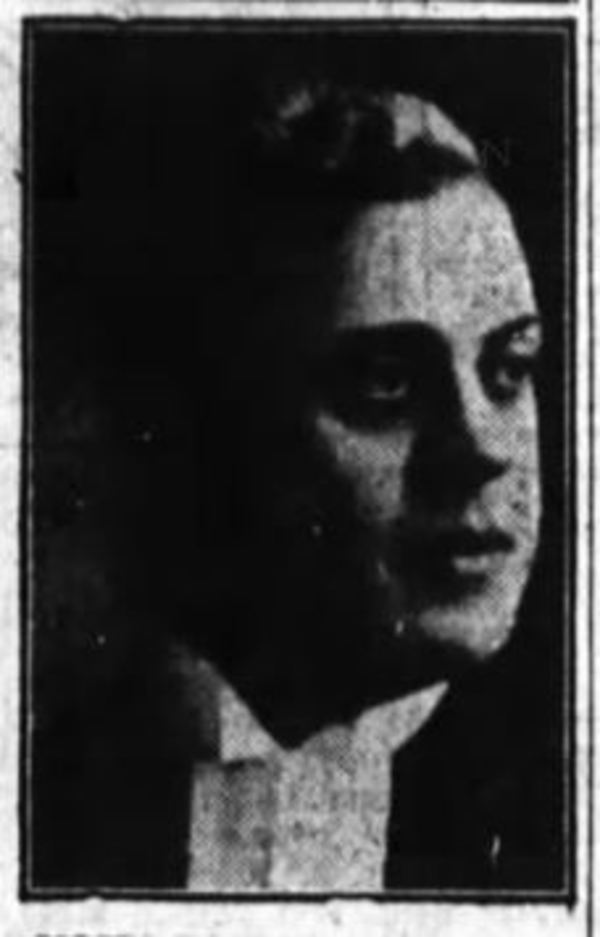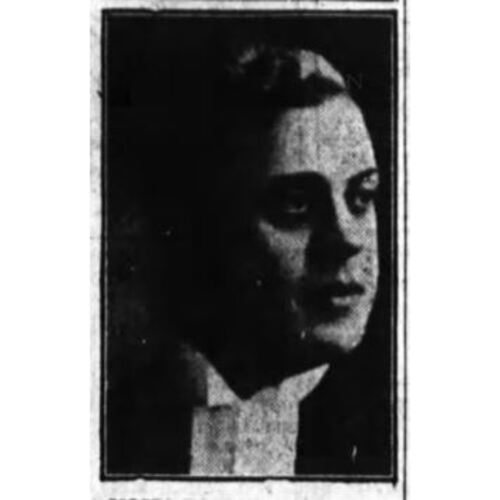
Source: Link
DOCTOR, MOSES, lawyer and community leader; b. 1900 in Vilna (Vilnius, Lithuania), one of the 11 children of Louis Doctor and Dora Gunon (Ganon); m. 28 Oct. 1926 Rose Florence in Montreal; they had no children; d. 20 March 1934 in Ottawa and was buried there in the United Jewish Community Cemetery (Jewish Memorial Gardens).
Moses Doctor immigrated to Ottawa with his family in 1901. The following year his father, Louis Doctor, a noted Jewish scholar and bibliophile, became the cantor and rabbi of the Agudath Achim synagogue on Rideau Street. He would hold that position until his death 32 years later. He was eulogized by the Ottawa Evening Citizen as “one of the most devout orthodox Jews in the Capital.”
Young Moses attended Osgoode Hall law school in Toronto and settled back in Ottawa after being called to the bar in 1924. Two years later he became a partner in the law office of Benjamin Goldfield, and then in 1930 Doctor opened a firm with Royden Ambrose Hughes. By 1932 Doctor had distinguished himself as a rising star through his participation in high-profile cases. In 1929 he successfully defended Canada’s youngest member of parliament, 27-year-old Louis-Mathias Auger of Hawkesbury, who had been accused of raping 17-year-old Laurence Martel when she visited his office to be interviewed for a government secretarial job. (This was the third of five trials for Auger, who was eventually found guilty of seduction.) Three years later, assisted by his partner Hughes, he managed to obtain an acquittal of the charge of murder for Benjamin Simon Edelson, an Ottawa jeweller who had shot and killed his wife’s lover, Jacob Horwitz. Although this was his first murder case, Doctor’s performance at the trial drew accolades, especially his 50-minute closing argument, which, according to the Citizen, “was described by many eminent lawyers who crowded the court room on Saturday, as one of the most brilliant and effective ever heard in a local court.”
With the Edelson victory, Doctor cemented his status as a highly successful criminal lawyer in Ottawa. He was consistently praised for his sharp mind, honour and integrity, wide legal knowledge, and experience in a variety of courts. In addition to winning fame in the capital’s legal circles, he gained prominence in the city’s Jewish community. He was extensively involved in social-service agencies, educational pursuits, synagogue life, and Zionist groups. He co-founded with his father the Ottawa Hebrew Free Loan Society, became vice-president of the Ottawa Hebrew Benefit Society, served as a Hebrew teacher and president of the Ottawa Talmud Torah, and was president of Agudath Achim and a member of its choir. His final public appearance was as master of ceremonies at a tribute dinner for Lillian Freiman [Bilsky], a noted philanthropist and Zionist activist.
Moses Doctor was just 33 years of age when he died suddenly on 20 March 1934. His body was found by the housekeeper of a rented O’Connor Street apartment, which he used as a study retreat from his home on Lady Grey Drive and his busy law office. His funeral, held the next day, was attended by more than 2,000 people, including such luminaries as Ottawa mayor Patrick James Nolan, as well as Doctor’s father, his eight surviving siblings, and his young widow, Rose.
Newspaper obituaries were quick to acknowledge Doctor’s dedication to his religious identity and his role in Ottawa society. The Ottawa Evening Journal recognized that he “found time, despite a growing practice, to interest himself in the affairs of his own people and of his community,” and remarked that he “had brought distinction to his race.” The press also admired Doctor’s success at integrating himself into the dominant culture: for example, he had been active in the Conservative Party and was a member of the Ottawa Humane Society, St Patrick’s College, and the Ottawa Federated Charities. Despite the anti-Semitism then prevalent in Canada, he earned the high regard of the city’s Gentile establishment. The Journal noted, for example, “the remarkable gathering of persons of all classes and creeds” at his funeral, as well as “the general loss felt in the community, not only among the Jewish people but by all classes associated with the lawyer.”
Despite the detailed press coverage, Doctor’s death was shrouded in mystery. After only a cursory investigation the coroner ruled that he had died from heart failure due to natural causes, and that a formal inquest would not be required. Both the Journal and the Citizen seemed to make a concerted effort to pre-empt suspicions about Doctor’s shocking demise, reporting that he had undergone surgery for ulcers and had complained of exhaustion in the last few months. Given his demanding law practice and extensive volunteer work, it was no wonder, the Journal commented, that Doctor’s many obligations had “taxed his constitution to the uttermost.” As well, both newspapers assured readers that the married Doctor had used the apartment for business purposes, explaining that “his retreat was well-known to his family and office staff” and that he had “never used the apartment at night but only for a few hours in the daytime.”
What Ottawa journalists may have known was that Moses Doctor had taken his own life, likely by overdosing on sleeping pills or ingesting poison. Family members have offered several plausible explanations for his suicide. He might have been overwhelmed by massive debt, a scenario supported by the valuation of his estate, which had $12,500 in assets but more than $20,000 in liabilities. Royden Hughes, who was convinced that Doctor had committed suicide because of financial difficulties, later attributed his partner’s debts to his generous spirit and unstinting philanthropy. It was also rumoured that Doctor was ashamed about engaging in an adulterous affair and that he suffered guilt for having helped to exonerate Ben Edelson, who he privately believed had committed murder. Whatever the reason or reasons for his decision, the devastating tragedy no doubt traumatized his father, who died six months later, and Rose, who never remarried.
The absence of an inquest, the reported cause of death, and the defensive attitude of the newspapers all effectively concealed the circumstances of Moses Doctor’s death. Attempted suicide was a crime in Canada in 1934, and the stigma associated with his name would have been especially pronounced given that he was an esteemed officer of the court. Moreover, because suicide is forbidden in Judaism, the cover-up helped to preserve his place in the Jewish cemetery. His burial there was a crucial religious and ethical issue, the more so because Doctor was not only a Jewish leader and role model, but also the son of a prominent rabbi.
The principal source for this biography is Monda Halpern, Alice in Shandehland: scandal and scorn in the Edelson/Horwitz murder case (Montreal and Kingston, Ont., 2015), which is based largely on the accounts of the trial in the Ottawa Citizen and the Ottawa Evening Journal, the Ottawa Jewish Arch., the City of Ottawa Arch., the private collection of Sharon Edelson, and interviews with members of the Edelson and Horwitz families.
AO, C 81-1-0-28 (Interviews with Roydon Hughes), container B436865, 28 Oct. 1983; RG 22-354, no.16686/1934; RG 80-8-0-988, no.009599; RG 80-8-0-1492, no.10110. Ottawa Jewish Arch., I0001 (A. L. Florence fonds); I0196 (Rabbi Saul Aranov fonds), “Decade of immigration and organized Jewish education, 1902–1911: the continuing saga of the synagogues,” chap. in untitled ms by Rabbi Aranov on Jewish life in Ottawa (1892–1992); I0202 (Reverend Louis Doctor fonds), Ottawa Talmud Torah 1st annual banquet booklet. Ottawa Citizen, 18 Jan. 1932; 21, 22 March, 20 Sept. 1934. Ottawa Evening Journal, 18 Jan. 1932, 21, 22 March 1934. Constance Backhouse, “Rape in the House of Commons: the prosecution of Louis Auger, Ottawa, 1929,” in Essays in the history of Canadian law: a tribute to Peter Oliver, ed. Jim Phillips et al. (Toronto, 2008), 33–66. Max Bookman, “Excerpts from a history of the Jew in Canada’s capital,” in Canadian Jewish reference book and directory, comp. Eli Gottesman (Montreal, 1963), 387–405. Ben Isaacson, Dictionary of the Jewish religion, ed. David Gross (New York, 1979). The Jew in Canada: a complete record of Canadian Jewry from the days of the French régime to the present time, comp. A. D. Hart (Toronto and Montreal, 1926). Abraham Lieff, Gathering rosebuds (Toronto, [1991]).
Cite This Article
Monda Halpern, “DOCTOR, MOSES,” in Dictionary of Canadian Biography, vol. 16, University of Toronto/Université Laval, 2003–, accessed December 31, 2025, https://www.biographi.ca/en/bio/doctor_moses_16E.html.
The citation above shows the format for footnotes and endnotes according to the Chicago manual of style (16th edition). Information to be used in other citation formats:
| Permalink: | https://www.biographi.ca/en/bio/doctor_moses_16E.html |
| Author of Article: | Monda Halpern |
| Title of Article: | DOCTOR, MOSES |
| Publication Name: | Dictionary of Canadian Biography, vol. 16 |
| Publisher: | University of Toronto/Université Laval |
| Year of publication: | 2020 |
| Year of revision: | 2020 |
| Access Date: | December 31, 2025 |



